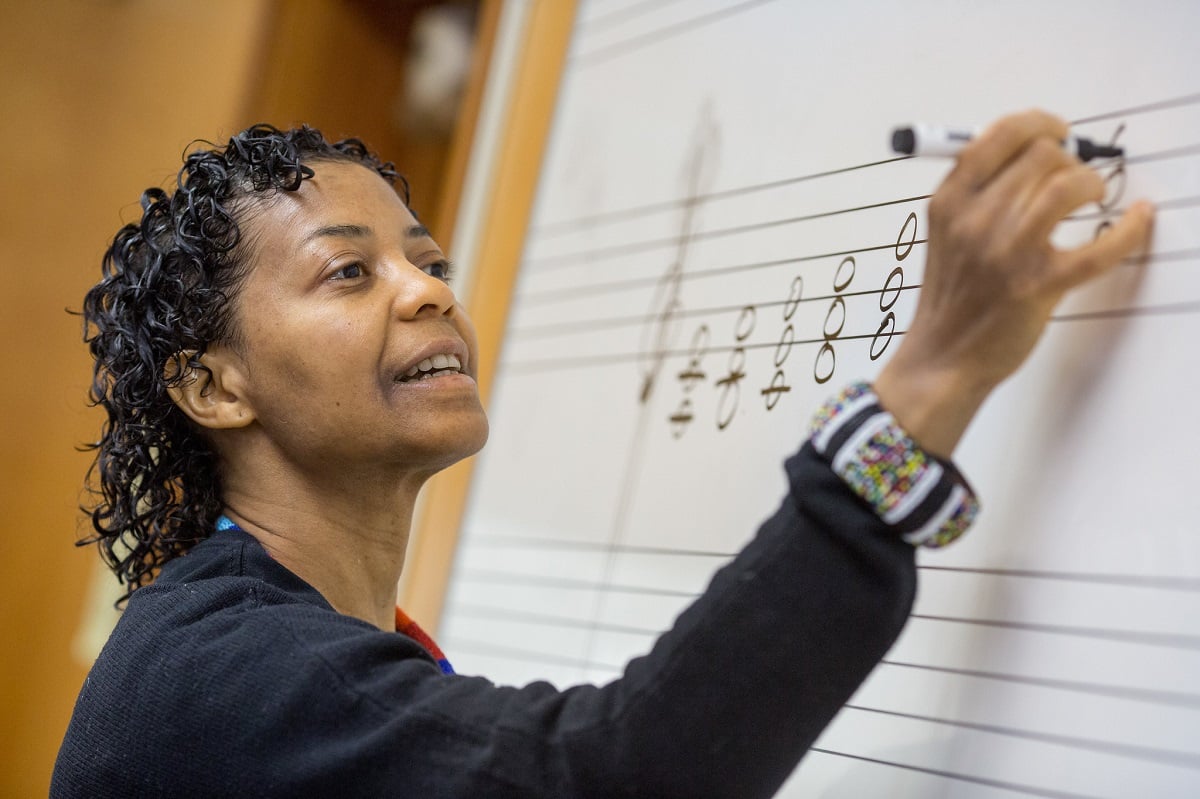
Redeploying teachers deprives students of specialist teaching in two subjects, critics say
Photo: Allison Shelley/The Verbatim Agency
Schools may have to suspend music teaching, DfE warns
Professionals have voiced "real concerns" over the proposal, saying it would harm pupils more than it helps them.
A warning that music teaching may need to be suspended to cope with rising staff absences has sparked widespread alarm.
Head teachers, industry bodies and politicians have strongly opposed Ofqual Chair Ian Bauckham's "depressing" suggestion, made on a Department for Education forum for school leaders.
First reported by teachers' magazine Tes, Bauckham's post acknowledges pausing specialist subjects, "however undersirable, [may] become necessary".
READ MORE:
"In cases where a specialist teacher rotates between classes to teach subjects that sometimes include for example PSHE, RSHE or music, it may be possible temporarily to suspend the teaching of that subject and use that teacher to teach classes whose normal teacher is absent and unable to teach remotely."
Practical subjects could focus more on theory so specialist teachers can work elsewhere in the school, "including to prioritise provision for exam cohorts", he wrote.
Ofqual says Bauckham's comments were made not in his capacity as the regulator's chair, but as Chief Executive of the Tenax Schools Trust.
The Department for Education said it has asked schools for contingency plans in case of high rates of staff absences.
"We are working with the sector to share case studies of flexible learning models in the event of high workforce absence, supporting the development of schools’ contingency plans, and we are grateful for Ian’s contribution.”
Music Mark and the Music Teachers Association, together representing 5,000 teachers, issued a joint statement calling the idea "short-sighted and inappropriate".
"The good-natured intention to support schools is undermined by a recommendation that music, and other subjects, should be removed from the curriculum at a time when pupils both need and want this to continue."
Challenge accepted
Good ideas are needed to tackle staff shortages in schools – "but denying students a broad and balanced curriculum is not one of them", ISM Chief Executive Deborah Annetts says.
The Government has urged the importance of music making and singing at all stages of the recovery curriculum.
But teacher shortages are significant: a poll of National Association of Head Teachers members on Friday (January 7) found 27% had at least one in 10 teachers absent on the first school day of 2022.
Nine percent said more than a fifth of teachers were off sick.
"School leaders need to be free to arrange the delivery of education according to the resources available to them, not on the basis of the normal school week," the association's General Secretary Paul Whiteman said.
Annetts said redeploying specialist teachers may contravene their employment conditions, which say they should provide cover "rarely and only in circumstances that are not forseeable".
"Given that the pandemic has now lasted for nearly two years, during which there has been a consistent lack of protection for pupils and their teachers, the current staff shortages have been all too foreseeable," she wrote in a letter to Bauckham.
Music Teachers Association President Don Gillthorpe said that while it is head teachers who ultimately make the call on risk and contingency plans, Bauckham's proposal will "unfortunately, be noticed and emulated".
Schools must be encouraged to find more inclusive solutions to the challenges of Covid that include full curriculum access.
"Music is part of pupils’ entitlement to a broad and balanced curriculum and the pandemic does not alter this."
'Second class discipline'
Pausing music teaching reinforces the idea that it's merely "nice to have" when it is in troubled waters due to the pandemic, critics say.
"This is nonsense. Learning about calculus and covalent bonding is important," Head Teacher Dr Millan Sachania wrote in The Times.
"Our youngsters cannot emerge from the pandemic in good spirits without engaging with music, literature and the creative and performing arts… these subjects are the fount of mental health."
UK Music Chief Executive Jamie Njoku-Goodwin said music and other subjects are being treated as "second class disciplines".
"We need more music in schools, not less – and suspending music education now would be totally wrong."
Music Mark CEO Bridget Whyte commented: "This ongoing perception of a hierarchy of subjects is unhelpful when creativity is a vital skill for the future.”
Join the Discussion
You must be logged in to post a comment.